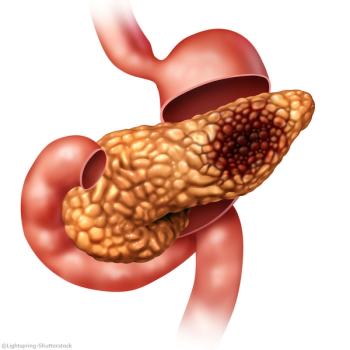
Oncology NEWS International
- Oncology NEWS International Vol 14 No 3
- Volume 14
- Issue 3
Smoking Speeds Progression of Pancreas Ca
HOLLYWOOD, Florida-Smoking not only increases the risk of developing pancreatic cancer but also speeds disease progression, according to Randall E. Brand, MD. In a presentation at the 2005 Gastrointestinal Cancers Symposium (abstract 76), Dr. Brand said that current smokers develop pancreatic cancers about 10 years sooner than nonsmokers. "Smoking at any age has an impact on the age of diagnosis of pancreatic cancer," Dr. Brand said. "To our knowledge, this is the first report that provides compelling evidence for the role of cigarette smoking early in neoplastic transformation of the pancreas."
HOLLYWOOD, Florida-Smoking not only increases the risk of developing pancreatic cancer but also speeds disease progression, according to Randall E. Brand, MD. In a presentation at the 2005 Gastrointestinal Cancers Symposium (abstract 76), Dr. Brand said that current smokers develop pancreatic cancers about 10 years sooner than nonsmokers. "Smoking at any age has an impact on the age of diagnosis of pancreatic cancer," Dr. Brand said. "To our knowledge, this is the first report that provides compelling evidence for the role of cigarette smoking early in neoplastic transformation of the pancreas."
Previous studies had estimated that about 25% of pancreatic cancer cases are strongly associated with smoking, which is "the most significant and reproducible environmental risk factor" associated with this cancer type, Dr. Brand said. In the United States, there are more than 30,000 new cases of pancreatic cancer diagnosed each year, and most patients die within the first year after diagnosis.
Dr. Brand and his colleagues at Northwestern University’s Feinberg School of Medicine used data from the Cancer Information Resource File (CIRF) to examine the impact of smoking on the age of diagnosis of pancreatic cancer. The CIRF includes data from more than 350 teaching and community hospitals. The investigators identified 18,346 pancreatic cancer patients with available smoking histories. Dr. Brand said that demographically, these patients resembled the general population: 52% were males, 86% white, 12% black.
The analysis showed that pancreatic cancer patients who were current smokers were diagnosed about 10 years younger than those who were never smokers (age 63 vs 73, P < .001). "Smoking appears to accelerate the onset of pancreatic cancer development," Dr. Brand said. Previous smokers were diagnosed at a median age of 70. The smoking-related accelerated progression was found in all cancer stages.
Stopping Smoking
Interestingly, stopping smoking eventually reversed this effect in men but had less impact in women. Dr. Brand reported that men who had stopped smoking were not younger than male never smokers at the time of pancreatic cancer diagnosis (age 70 for both). Females who stopped smoking developed pancreatic cancer later than current smokers (age 71 vs 65) but did not revert back to the same age of diagnosis as a never smoker (74), Dr. Brand said. He told ONI that it would be interesting to compare the effect of stopping smoking in premenopausal vs postmenopausal women, but those data are not available in this database.
Initiation and Progression
"Our analysis strongly suggests that smoking may augment both the initiation and the progression phases of pancreatic cancer carcinogenesis," Dr. Brand said. "The age of diagnosis of previous smokers is younger than nonsmokers, suggesting that smoking augments the initiation phase. The age of diagnosis of current smokers is younger than previous smokers and never smokers, indicating that smoking augments the progression phase."
Dr. Brand emphasized that "to stem the tide of increasing pancreatic cancer deaths and reduce the additional years of lost life due to the earlier diagnosis" is likely to require not only helping current smokers quit but preventing never smokers from beginning to smoke.
The mechanism underlying the effect of smoking on the pancreas is uncertain. Dr. Brand said that researchers had suspected that carcinogens derived from tobacco smoke might become concentrated in the bile, but "preliminary data do not support that."
Articles in this issue
almost 21 years ago
Alcohol, Obesity, and Smoking Risk Factors for HCCalmost 21 years ago
Adding Bevacizumab Improves Response to Oxaliplatin Regimensalmost 21 years ago
Capecitabine Promises Convenience, Efficacy in LARC, Five Studies Showalmost 21 years ago
Avastin Enhances FOLFOX Efficacyalmost 21 years ago
Panitumumab, Anti-EGFR MoAb,Promising in Colon Canceralmost 21 years ago
Oxaliplatin/Gemcitabine Effective in Advanced Pancreatic Canceralmost 21 years ago
Study Strengthens Evidence of Link Between Liver Cancer and Diabetesalmost 21 years ago
Capecitabine Promises Convenience, Efficacy in LARC, Five Studies Showalmost 21 years ago
Capecitabine Equal to Bolus 5-FU/LV in Adjuvant Therapy for Colon CancerNewsletter
Stay up to date on recent advances in the multidisciplinary approach to cancer.






































